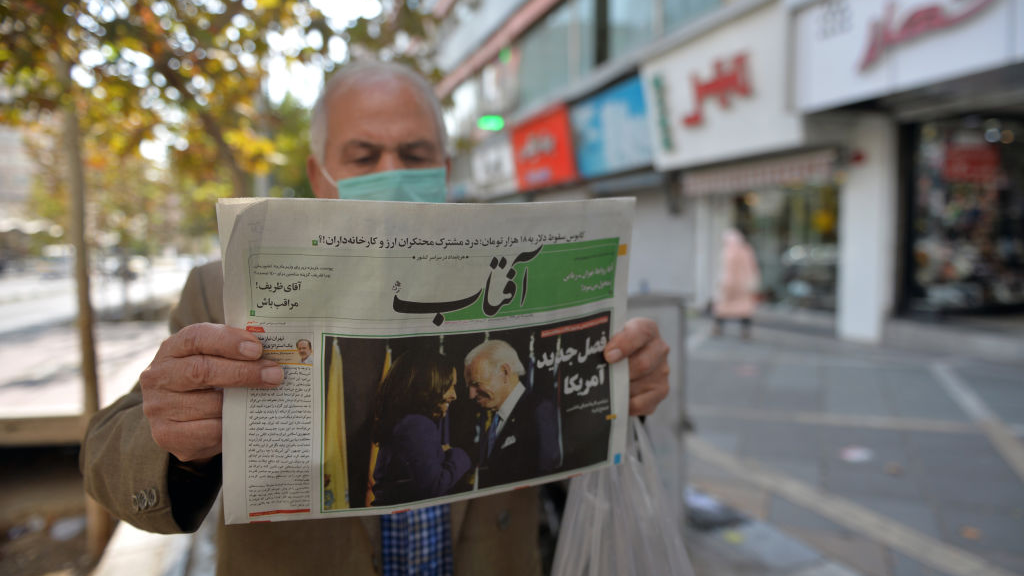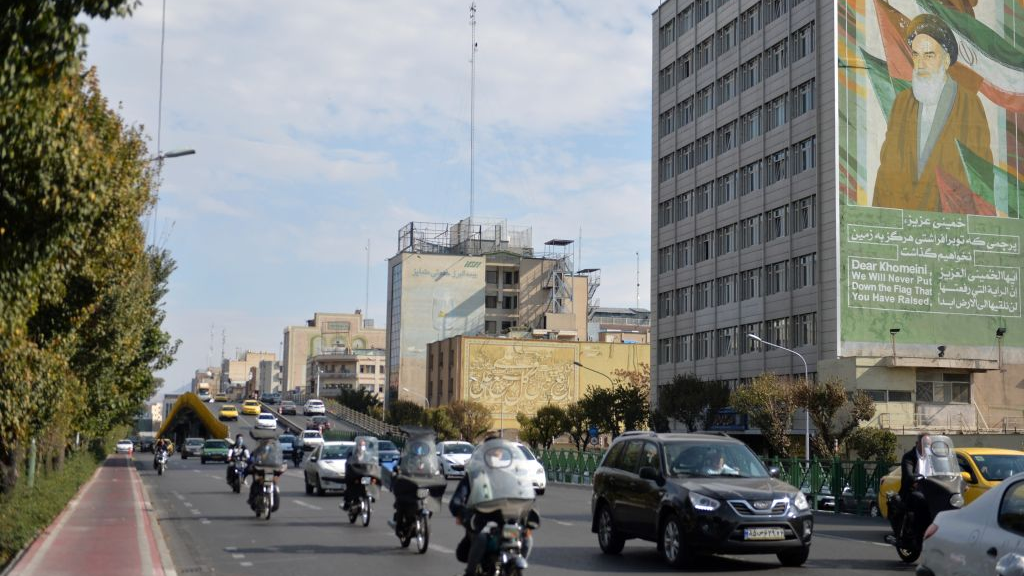
A citizen reads the news regarding the U.S. elections in newspapers, in Tehran, Iran, November 9, 2020. /Getty
A citizen reads the news regarding the U.S. elections in newspapers, in Tehran, Iran, November 9, 2020. /Getty
Editor's note: Asif Durrani is former ambassador of Pakistan to Iran and the UAE, who also served in Afghanistan as deputy chief of mission (2005-2009). At present, he is working as a senior research fellow at Islamabad Policy Research Institute. The article reflects the author's opinions and not necessarily the views of CGTN.
A lot of haggling can be seen amongst the major players in the Middle East on Joe Biden's glimmering that after the U.S. election he would rejoin the Iranian nuclear deal, called the Joint Comprehensive Plan of Action (JCPOA).
Undoubtedly, Biden's decision would be a big international event despite many pitfalls forecasted by analysts because of his predecessor President Donald Trump's punitive actions against Iran. A flurry of activity led by Saudi Arabia and Israel is discernible to block the U.S. decision to unfreeze the logjam on the nuclear agreement with far-reaching implications for the region and beyond.
Certainly, there are many misgivings about the JCPOA amongst the Saudis and Israelis dating back to 2015 when the Obama administration, after protracted talks spanning over two years, signed the JCPOA in which Iran committed to forego the nuclear weapons option. In return, the U.S. and its Western allies, the E-3 (France, Germany and UK), agreed to ease out nuclear-related sanctions.
Admittedly, Biden would be facing an uphill task at the hands of Israel and Saudi Arabia if he proceeds with his election promise and rejoins the JCPOA, especially in a situation where Trump imposed more sanctions against Iranian leaders and business entities.
The question arises as to why there has been a sharp difference in the Trump and Obama-Biden approaches towards the Iranian nuclear deal which has almost pushed the entire Middle East to the brink of a disastrous war. While signing the agreement, the Obama administration did not insist on including the Iranian missile program and its interference in the Middle East, Trump considered these issues as essential elements to address the ongoing tussle between Iran and the major powers in the region.
For Israel, Iran's attempts to encircle Israel through Syria, Lebanon and Palestinian Hamas are considered as a veritable threat that needs to be countered, including the military option. Not only that, the signing of the Abraham Accords by the UAE, Bahrain, Sudan and Morocco with Israel and the latter's hand in the killing of Iranian nuclear scientist Mohsen Fakhrizadeh, essentially point towards firewalls being built to keep Iran isolated.
For the Saudis, the Iran-led Shia crescent comprising Iraq, Syria and Lebanon poses a direct threat not only to the Saudi leadership of the Middle East but to the Gulf monarchies with a sizable Shia population. Iran's support of Houthis in Yemen is seen as a direct provocation to Saudi Arabia.
In order to save their monarchies, the Gulf states are determined to exhaust all options, including shaking hands with Israel. Already Saudi Arabia has demanded that Biden must consult the Gulf states before rejoining the JCPOA. Israel is also making a strong pitch through behind-the-scene maneuvers to convince President Biden to keep Iran under pressure.
For Iran, Trump's sanctions have had a negative impact causing hardships to the common people. This measure has partially alienated the populace against the clergy but it has equally increased hatred against the United States. Despite American sanctions, Iran has gained in stature and influence in Iraq, Syria, Lebanon and Palestinian Hamas.

A view from a street in Tehran, Iran, November 9, 2020. /Getty
A view from a street in Tehran, Iran, November 9, 2020. /Getty
Militarily, it has acquired the capacity to choke the Strait of Hormuz and target the Gulf states at will. Therefore, American sanctions have achieved marginally if the idea was to bring Iran to its knees.
Meanwhile, Trump's sanctions have put the Iranian moderates like President Hassan Rouhani on the defensive. In all probability, hardliners are going to win the presidential elections in June this year. Rouhani has already warned that if oil and banking-related sanctions against Iran were not lifted by February, then Iran would enhance the production of nuclear fuel and expel UN monitors from the country. Concurrently, Iran is demanding $70 billion from the U.S. in compensation for loss of revenue in oil sales due to sanctions.
Internationally, the punitive actions against Iran have failed to gather enough support to isolate the latter politically. In fact, all the signatories of JCPOA were critical of the American decision to withdraw from the agreement. The U.S. also received a setback at the UN when none of the permanent members supported frantic U.S. efforts to extend the UN arms embargo which expired last October 18.
The U.S. was so isolated that apart from its own vote it got a vote from the Dominican Republic while China and Russia opposed the resolution and remaining members including France, the UK and Germany abstained. It was a clear message by the Security Council that the unilateralist U.S. approach would not be acceptable for a stable world order.
Biden's rejoining of the JCPOA would be a right step in the right direction for two reasons. First, it would not only rekindle the hope for the revival of disarmament machinery paralyzed for the past three decades primarily because of the U.S. hardline approach, but also augur well for multilateralism which suffered immensely due to Trump's unilateralist impulsiveness.
Biden also indicated during his election campaign that he would rejoin the Paris climate agreement on climate change as well as the World Health Organization (WHO). Strangely, Trump had decided to leave the WHO at a time when American leadership to fight COVID-19 was badly needed.
Second, and a very important aspect which Trump ignored was that by leaving the JCPOA, the U.S. forsook the right to raise demands with Iran on its missile program or its approach toward the Middle East. Iran is likely to resist discussion on the twin issues on the pretext that these are outside the purview of the deal, but, in the end, Iran cannot escape its responsibility by shunning these interlinked issues indefinitely.
The rejoining of the JCPOA would strengthen Biden's negotiating position and, perhaps, open up doors for future dialogue to address the chronic crisis in the region. Hopefully, the Israelis and Saudis would also realize that the use of diplomatic options may have better chances of success than raking up tensions with unintended consequences.
(If you want to contribute and have specific expertise, please contact us at opinions@cgtn.com.)

